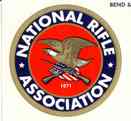 In a week that highlighted the medical-research value of Nepalese monkeys and the misfortunes and miracles of mountaineering, you’d think the headlines couldn’t get any better for Nepal. The real story of the week turns out to be the ally the U.S. National Rifle Association (NRA) has found in our Maobadis.
In a week that highlighted the medical-research value of Nepalese monkeys and the misfortunes and miracles of mountaineering, you’d think the headlines couldn’t get any better for Nepal. The real story of the week turns out to be the ally the U.S. National Rifle Association (NRA) has found in our Maobadis.Gopal Khambu, chief of the Kirat Peoples’ Government and Maoist central member, said the new constitution should give right to each citizen of Nepal to own a gun. That is a refreshing platform to head into the constituent assembly elections. With its exclusive focus on the future of the monarchy, the political discourse had started becoming staid.
To be sure, there was no dearth of weighty things to talk about. Scientists investigating the genetic makeup of rhesus macaque monkeys, a key species used in biomedical research found the rhesus in Nepal may provide a suitable alternative to alleviate a critical shortage of laboratory animals used in work to develop vaccines against diseases such as HIV/AIDS.
Writing in the cover story of the current issue of the American Journal of Primatology, researchers headed by Randall Kyes of the University of Washington report that the Nepali macaques are more closely related genetically to rhesus macaques from India than rhesus macaques of China.
This is important because Indian-origin animals have been used for more than half a century in biomedical and behavioral research. Rhesus macaques have contributed to the discovery of vaccines to prevent diseases such as polio and yellow fever, and represent one of the most widely used primate models for AIDS-related research. India, however, banned the export of all macaques in 1978, thus leading to the current shortage.
Issues of life and death on the Himalayas, too, raised more somber questions this season. Dozens of summit-bound Everest buffs left David Sharp, a 34-year-old Briton, to die of oxygen deficiency on his way back from the top of the world.
By voicing his shock at the callous disregard for the welfare of others, Everest pioneer Sir Edmund Hillary set off a serious debate on mountaineering ethics. Before that perspective could fully play out, word came in that Lincoln Hall, a 50-year-old Australian, was available to narrate his ordeal a day after being declared dead at 8,700 meters. This back-from-the-dead news peg underscored the perils of jumping the gun.
Khambu, however, stole the show and not just by encouraging Nepalis to read the Second Amendment to the U.S. Constitution. His right-to-bear-arms platform ties in perfectly with the latest campaign of Wayne LaPierre. The executive vice-president of the NRA, arguably the most powerful interest group in the United States, has written a new book “The Global War on Your Guns: Inside the UN Plan to Destroy the Bill of Rights”.
The context is the United Nations Small Arms Review Conference at UN Headquarters in New York from 26 June to 7 July. Representatives from governments, international and regional organizations and civil society will to review the efforts and progress made at all levels to address the illicit trade in small arms and light weapons and devise future action.
By unanimously adopting a UN Program of Action in 2001, the UN members committed to collecting and destroying illegal weapons, adopting and/or improving national legislations that would help criminalize the illicit trade in small arms, regulating the activities of brokers, setting strict import and export controls, taking action against violators of such laws, and better coordinating international efforts to that end.
LaPierre argues that the UN wants to take away guns because it is club of governments that want to strip opposition forces of the means to challenge their authority. During the 20th century, he stresses, governments murdered 169 million people in various parts of the world. Individual gun ownership, he adds, is the ultimate protection against tyranny.
Our own Prachanda could not have said it better. The rebel supreme might want to call off his unpopular “fundraising” tactics and build bridges with the American gun lobby.
A formal Maoist-NRA alliance would have to cross a number of hurdles. For one thing, the NRA is a staunchly Republican organization; the Maoists would have to tone down their tirades against President George W. Bush and his global war on terror.
It might be worth the effort. The NRA could then be expected to deploy its massive PR machinery to pull the Maoists off the State Department’s terrorist list.